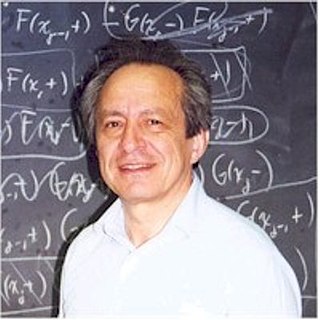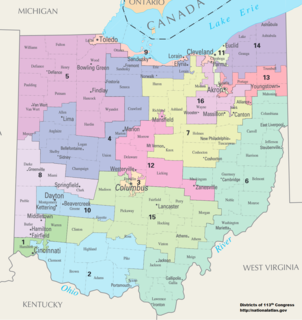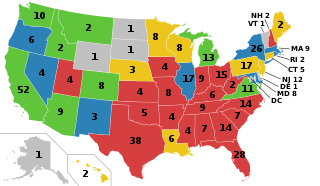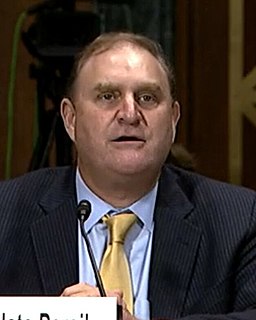Related Research Articles
Arend d'Angremond Lijphart is a Dutch-American political scientist specializing in comparative politics, elections and voting systems, democratic institutions, and ethnicity and politics. He is Research Professor Emeritus of Political Science at the University of California, San Diego. He is influential for his work on consociational democracy and his contribution to the new Institutionalism in political science.

Clifford Ambrose Truesdell III was an American mathematician, natural philosopher, and historian of science.
Samuel Merrill III is an American mathematician and political scientist best known for his work on alternative voting systems, voter behavior, party competition, and arbitration.

The 2003 Texas redistricting refers to a controversial mid-decade state plan that defined new Congressional districts. In the 2004 elections, this redistricting supported the Republicans taking a majority of Texas's House seats for the first time since Reconstruction. Opponents challenged the plan in three suits, combined when the case went to the United States Supreme Court in League of United Latin American Citizens v. Perry (2006).

Guillermo Owen is a Colombian mathematician, and professor of applied mathematics at the Naval Postgraduate School in Monterey, California, known for his work in game theory.

The Instituto Nacional Electoral (INE) is an autonomous, public agency responsible for organizing federal elections in Mexico, that is, those related to the election of the President of the United Mexican States, the members of the Congress of the Union as well as elections of authorities and representatives at local and state levels. The agency's president is Lorenzo Córdova Vianello, appointed in 2014 for a 9-year tenure.

Ohio is divided into 16 congressional districts, each represented by a member of the United States House of Representatives. After the 2010 Census, Ohio lost two House seats due to slow population growth compared to the national average, and a new map was signed into law on September 26, 2011. This map was ruled unconstitutional as partisan gerrymandering, and state Republicans were told to redraw the map before June 14, 2019. However, on October 7, 2019, the U.S. Supreme Court dismissed the challenge to the map, allowing it to stay in effect for the 2020 election.

Virginia is currently divided into 11 congressional districts, each represented by a member of the United States House of Representatives. The districts were redrawn most recently in 2016 by court order.

The School of Social Sciences is an academic unit of the University of California, Irvine (UCI) that studies the social sciences. The School is the largest academic unit in the university with an enrollment of over 5,300 students. More than a third of the bachelor's degrees conferred at UCI are from the School of Social Sciences. It is home to the departments of Anthropology, Chicano-Latino Studies, Cognitive Science, Economics, Logic and Philosophy of Science, Political Science, International Studies, and Sociology.
Sean P. Trende is an American journalist and political analyst specializing in American elections analysis. He is a Senior Elections Analyst at RealClearPolitics. He has regularly appeared as a guest on Fox News, NPR’s All Things Considered, and CNN Radio. The Washington Times calls him "a premier political number cruncher". He is the author of Lost Majority, published by Palgrave Macmillan. On September 12, 2012, National Journal announced that Trende would be a co-author of the 2014 Almanac of American Politics.

Gerrymandering in the United States has been used to increase the power of a political party. Gerrymandering is the practice of setting boundaries of electoral districts to favor specific political interests within legislative bodies, often resulting in districts with convoluted, winding boundaries rather than compact areas. The term "gerrymandering" was coined after a review of Massachusetts's redistricting maps of 1812 set by Governor Elbridge Gerry noted that one of the districts looked like a salamander.
Anthony "Tony" Fairfax is a Hampton, Virginia-based Geodemographic Consultant and President/CEO of CensusChannel LLC. Since the earlier nineties Fairfax has provided demographic and mapping services with a concentration on census data and redistricting.

Nathaniel Persily is the James B. McClatchy Professor of Law at Stanford Law School, where he has taught since 2013. He is a scholar of constitutional law, election law, and the democratic process.

The 2020 United States redistricting cycle is in progress following the completion of the 2020 United States census. In all fifty states, various bodies are re-drawing state legislative districts. States that are apportioned more than one seat in the United States House of Representatives are also drawing new districts for that legislative body.

Redistricting in Virginia has been a controversial topic due to allegations of gerrymandering. In the 2017 Virginia General Assembly, all of the redistricting reform bills were killed.
Abbott v. Perez, 585 U.S. ___ (2018), was a United States Supreme Court case dealing with the redistricting of the state of Texas following the 2010 Census.
Rucho v. Common Cause, No. 18-422, 588 U.S. ___ (2019), is a landmark case of the United States Supreme Court concerning partisan gerrymandering. The Court ruled that while partisan gerrymandering may be "incompatible with democratic principles", the federal courts cannot review such allegations, as they present nonjusticiable political questions outside the remit of these courts.

Redistricting in North Carolina has been a controversial topic due to allegations and admissions of gerrymandering.
Franklin Chandler Davidson was a professor of public policy and expert on voting rights at Rice University.
Moore v. Harper is a pending United States Supreme Court case related to the independent state legislature theory (ISL), arising from the redistricting of North Carolina's districts following the 2020 Census.
References
- ↑ McKinley, Jesse (2022-05-28). "How a Mapmaker Became New York's Most Unexpected Power Broker". The New York Times. ISSN 0362-4331 . Retrieved 2022-11-09.
- ↑ "A Wuffle Vita". University of California Irvine. Retrieved 13 October 2020.
- ↑ Cain, Andrew (November 17, 2015), "Expert proposes altering congressional maps of Scott's, Forbes' districts", Richmond Times-Dispatch .
- ↑ Bartel, Bill (February 1, 2016), "Supreme Court rejects request to delay Virginia's new congressional districts", The Virginian-Pilot .
- ↑ Moomaw, Graham. "Familiar expert named to redraw state's House districts". The Daily Progress. Retrieved 2018-10-19.